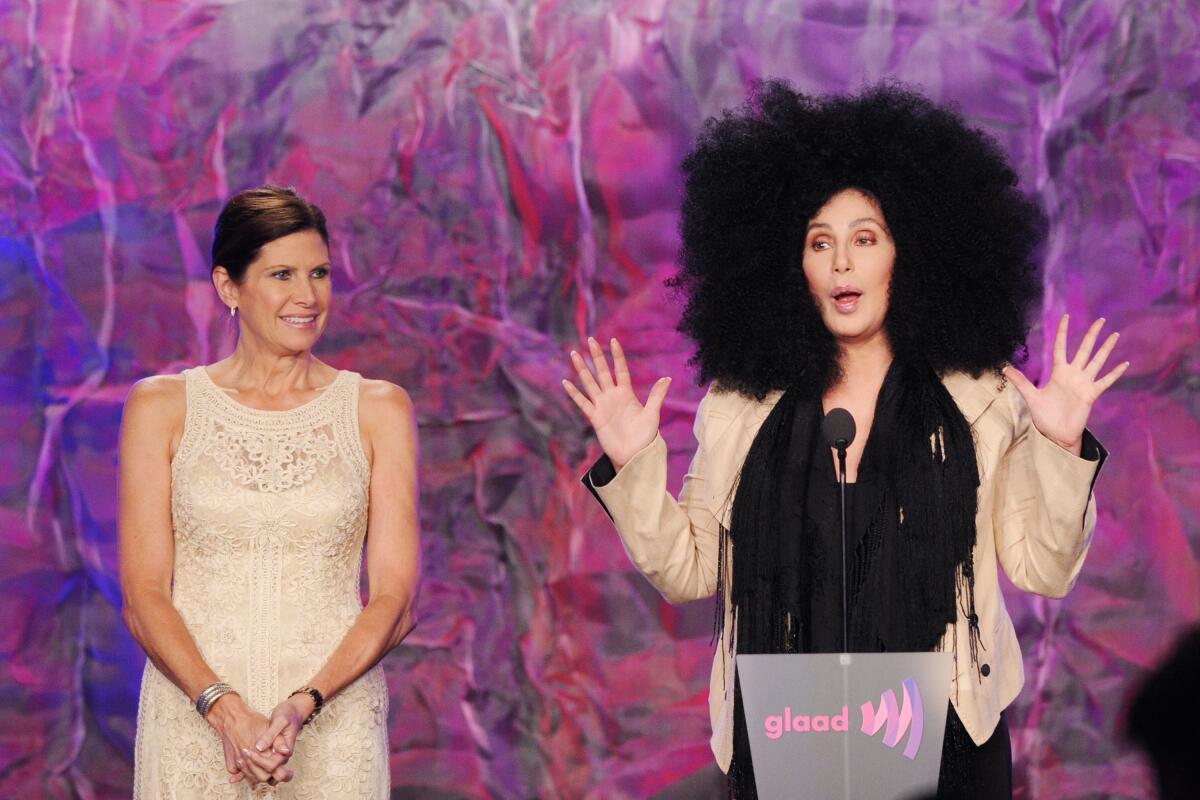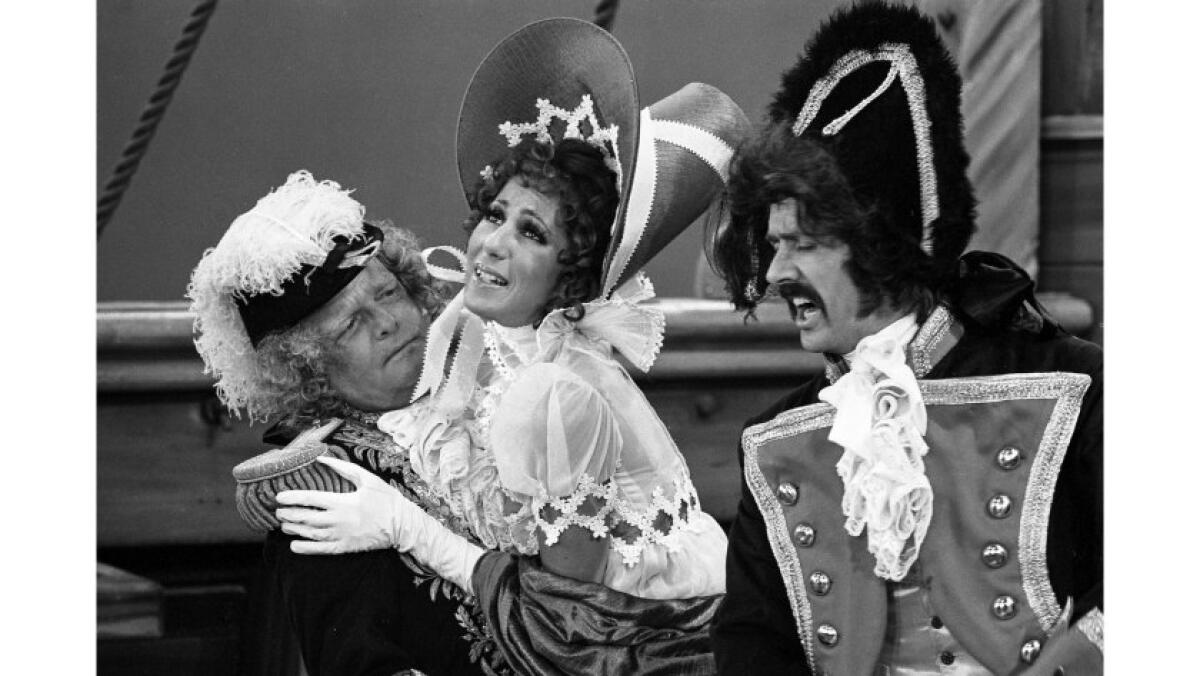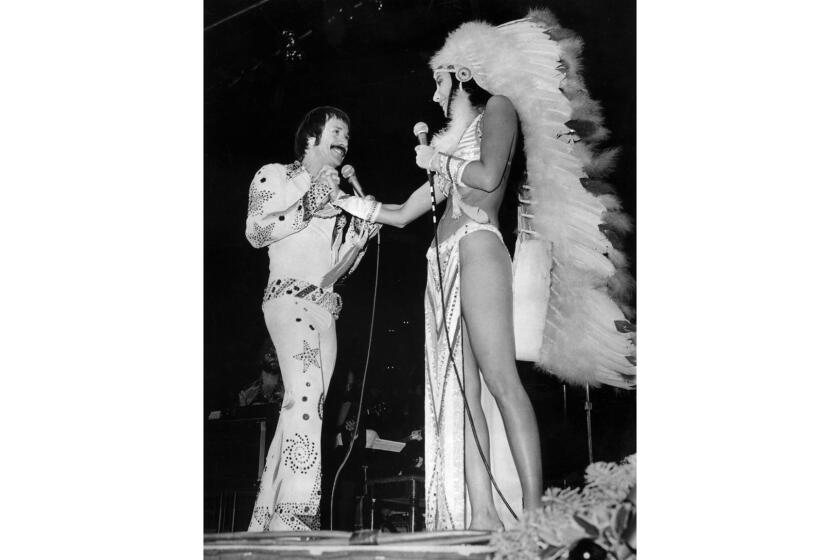Cher wants her Sonny & Cher royalties, and she’s suing Sonny Bono’s widow to get them

Call it a Cher fight.
Cher is suing Sonny Bono’s widow over royalties to songs the pop icon made famous with her ex-husband as the musical duo Sonny & Cher.
Cher filed a $1-million federal lawsuit Wednesday against former Rep. Mary Bono, a trustee of the Bono Collection Trust, and other individuals, accusing them of breach of contract.
The 75-year-old entertainer claimed that Bono’s fourth wife has tried to terminate provisions that entitle Cher to 50% ownership of the duo’s musical composition royalties, record royalties and other assets from their marriage.
Some of the hits cited in the filing include “I Got You Babe,” “The Beat Goes On,” “Baby Don’t Go,” “Little Man” and “Bang Bang (My Baby Shot Me Down).”

The “Sonny & Cher Comedy Hour” stars began performing together in 1964, married in 1969 and divorced in 1975. Cher went on to become a solo superstar, making new hits like “If I Could Turn Back Time” and “Believe” and even winning an Oscar for her role in “Moonstruck.”
Sonny Bono, who died in a Lake Tahoe skiing accident in 1998, pursued a career in California politics as a Republican congressman in Palm Springs. Mary Bono later won his House seat and has appeared alongside Cher at various events over the years.
Cher alleged that she and Sonny agreed to equal division of their community property when they settled their divorce in 1978.
Her legal team — led by the L.A. firm Davis Wright Tremaine LLP — contends that Sonny Bono “irrevocably assigned” those rights to Cher in 1978 “as her sole and separate property throughout the world and in perpetuity.” She “has been the unchallenged owner of her 50% share of all musical composition and record royalties during their collaboration and marriage,” according to the 20-page complaint, obtained Thursday by The Times.
Their performance was part of the annual KHJ Christmas benefit at the Forum in Inglewood.
Mary Bono is accused of trying to undo that agreement and deprive Cher of other long-established rights under the settlement, the lawsuit said.
“This action has become necessary because now, more than forty years after [Cher] received her 50% ownership of her and Sonny’s community property, Sonny’s fourth wife and widow, defendant Mary Bono, claims that a wholly inapplicable statutory termination provision of the Copyright Act of 1976 ... has undone [Cher’s] ownership of her royalties from the songs and recordings that she and Sonny made famous during their marriage, and deprived [Cher] of other long-established rights under the 1978 agreement,” the filing said.
But Mary Bono’s team contends that she was within her rights.
“The Copyright Act allows Sonny’s widow and children to reclaim Sonny’s copyrights from publishers, which is what they did,” Mary Bono’s attorney, Daniel J. Schacht, said in a statement to The Times. “Rep. Bono remains open to continuing a private discussion about this, but we are confident that, if necessary, the court will affirm their position.”
Cher’s complaint said that in 2016, Sonny Bono’s heirs, or a majority of them, and Wixen Music Publishing issued a notice of termination to various music publishers or other companies to whom Sonny Bono had granted a transfer or license of the renewal copyrights in the musical compositions.
The notice specified various effective dates of termination ranging from 2018 to 2026 and was issued without Cher’s knowledge or participation. Cher never requested that Wixen assist in the issuance of any notice of termination, the filing said.

Last month, the Bono Collection Trust told Cher’s representatives that the heirs’ notice of termination also terminated the stream of composition royalties that Sonny Bono assigned to her in 1978. As a result, the heirs’ statutory termination ends her right to those royalties and would no longer pay her or her Veritas Trust, the lawsuit said.
The Bono Collection Trust also contends that Cher no longer has approval rights in agreements with third parties regarding musical compositions and composition royalties. She is also no longer entitled to direct payment of her 50% of royalties from record companies or allowed to object to administration fees in excess of 10% and does not have the right to terminate the Wixen agreements, her lawyers said.
Cher talks about her love of classic movies, life during the pandemic, the eternal genius of David Bowie and why her memoir will be worth the wait.
Cher disputes each of the Bono Collection Trust’s contentions, according to the complaint. She is seeking $1 million in damages and wants a judge to enforce the 1978 divorce settlement splitting their royalties in the future.
Mary Bono has not yet filed a response to Cher’s lawsuit.
More to Read
The biggest entertainment stories
Get our big stories about Hollywood, film, television, music, arts, culture and more right in your inbox as soon as they publish.
You may occasionally receive promotional content from the Los Angeles Times.












